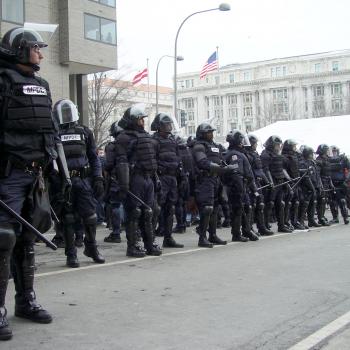In 2 Samuel 12, when Bathsheba’s first son was dying, David fasted and clamored with the Lord. After he died, David washed himself, ate a meal, and tried his best to move forward. That’s the position that many of us in the United Methodist Church face after several decisions made by this year’s General Conference. I feel like I made the best case I could on several issues (and I probably lost my credibility with some people I care about as a result). My church has made a decision, and I will move forward. I realize there are young adults who are wondering whether or not to leave the UMC at this point. I’d like to make a case for staying, because I think our vocation as a church right now is to occupy what Bishop Scott Jones calls “the extreme center,” as frustrating as that might sound. We are the only purple major Protestant denomination in the country right now. Every other one has split along theological or ideological lines into “left” and “right” or even further into “moderately conservative” and “fanatically conservative.” The reformed branch of Christianity probably has more sects than I have toes and fingers. What the body of Christ and our nation as a whole needs right now is a whole lot more purple and a whole lot less schism.
Nine years ago, when the Iraq war was starting, I was the coordinator of Tri-City Action for Peace in Saginaw, Michigan. We decided to hold a 24-hour vigil on a street corner in front of the downtown post office in March (which was freezing). I had to beat on my African drum to keep from getting frostbite. On the weekends, a group of people with American flags came and stood on the opposite corner and shouted “USA!” while we chanted slogans about peace. For a few weeks, it was like a competition to see which side could get more people on their corner. Our side took great pains to express that we were absolutely not anti-US or anti-military, though people on the other corner presumably felt like we were. But there was no conversation between us. Nobody changed their minds about anything. It was simply a contest to get cars to honk for us or honk for them.
Years later, I decided my second year of seminary to go completely outside of my comfort zone for my field education placement. I realized that I had never really gotten to know anybody from the military before. So I signed up to be a summer volunteer chaplain at the Durham VA hospital. One of my fellow chaplains was a retired US Army sergeant. He and I quickly became tight. The stories he had to share about the guys in his unit were a model for the kind of solidarity that I wish we had in the body of Christ. He was nothing like the testoserone-oozing misogynist that my indoctrination in identity politics had made me assume about someone with his vocation. He was a very compassionate, tender-hearted man. I’ll never forget watching the way that he interacted with my eldest son, who was about 3 at the time.
My time as a Durham VA chaplain was a decisive turning-point in my journey. I now serve in a church that is mostly military and reddish-purple theologically and politically. Some of my closest friends now are in the military, and though not everyone in the military is conservative, they are definitely conservative. I have about 4-5 guys who come over to my house every Wednesday night to share our struggles and pray together. They love me, and I love them. Ideology doesn’t enter into our communion together. We listen to each other and learn from each other. I trust that they are godly men, and God speaks to me through them.
So as I think about the division in the United Methodist Church, I wonder if we need to have more cross-regional fellowship and conversation that occurs outside the context of persuasion and deal-making. What would it look like for us to have national gatherings at which no decisions are made. Some of this is already happening but it needs to be better promoted. The problem we face is that our tribal lines are largely geographic. So we need a means of spending time together with people from elsewhere. I think it’s worth investing some resources into creating national gatherings whose focus is cross-regional relationship-building instead of just training or legislation.
There are two things that shape how I think about how to bridge the differences in our denomination. 1) The best antidote to ideological rigidity is personal friendship. 2) The way of reading the Bible particular to the Wesleyan strand of Christian thought will ultimately lead us to a just, merciful understanding of what we should do as Christian disciples. There are very ugly distortions of Christianity afloat right now in America that we have inherited largely from 19th-century revivalist soteriology and the early 20th-century fundamentalist/modernist controversy. These distortions have poisoned the Methodist well, but their antidote will take a long time to do its work. No disrespect to any protesters, but what we need now is four more years of holy friendship and patient teaching. Don’t walk out on our beautifully, painfully purple church. Don’t denigrate your brothers and sisters even if it’s valid to say that they don’t understand you. Let us all win each other for Christ.











